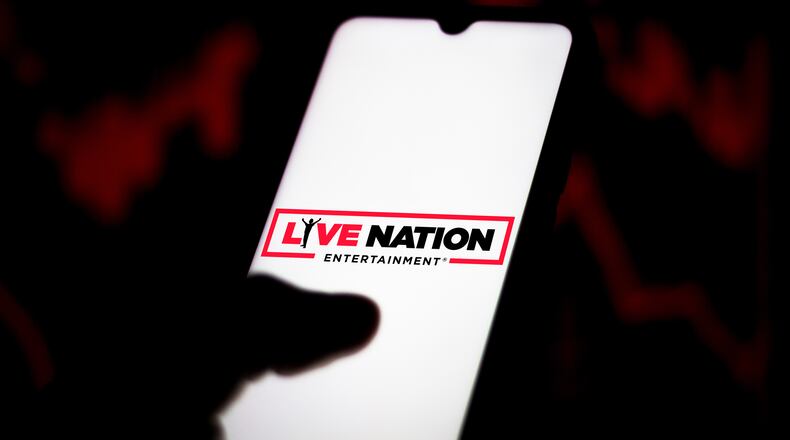The U.S. Department of Justice filed an antitrust lawsuit Thursday against Live Nation Entertainment, the California-based concert and venue operator with significant influence on Atlanta’s music scene, alleging it has outsized control over the live music industry.
The lawsuit, filed in the Southern District of New York, seeks to break up the business to restore competition in the marketplace. A bipartisan coalition of attorneys general from 29 states and Washington, D.C., signed onto the lawsuit. Georgia Attorney General Chris Carr, whose office did not immediately respond to a request for comment, was not one of them.
Across the country, Live Nation controls 60% of concert promotions at major concert venues, according to the DOJ complaint. Through Ticketmaster, Live Nation controls about 80% or more of major venues’ primary ticketing for concerts and a growing share of ticket resales in the secondary market.
According to the complaint, both Live Nation and its Ticketmaster subsidiary have stifled competition by acquiring or threatening retaliation against firms it saw as threats and signing long-term deals with venues that barred them from working with multiple ticketers to offer the best mix of prices, among several other reasons. Live Nation’s anticompetitive conduct has driven up prices and fees for consumers, the complaint alleges.
Live Nation is the most dominant entity in Atlanta’s live events industry — by a wide margin. It maintains long-term leases at the Chastain Park, Lakewood and Ameris Bank Amphitheaters, owns and manages the Tabernacle in downtown and operates the Buckhead Theatre and the Coca-Cola Roxy at The Battery. Several of Atlanta’s largest venues use Ticketmaster as its primary ticket outlet, such as State Farm Arena and Mercedes-Benz Stadium.
The litigation is not likely to have any immediate impact on operations, and it could be sometime before the case is resolved.
Live Nation has maintained that ticket pricing is out of its hands, noting that artists and teams set prices and decide how tickets are sold. The company’s executive vice president of corporate and regulatory affairs, Dan Wall, said in a statement Thursday that factors such as increasing production costs, artist popularity and online ticket scalping are “actually responsible for higher ticket prices.”
Live Nation, which has for years denied that it is violating antitrust laws, said Thursday that the lawsuit “won’t solve the issues fans care about relating to ticket prices, service fees and access to in-demand shows.”
Thursday’s legal action is the culmination of years of criticism against Live Nation from concertgoers, industry professionals and politicians. In 2010, Ticketmaster and Live Nation merged to form the now-dominant giant, which ended 2023 with $18.8 billion in concert revenue, $2.9 billion in ticket sales and $1.1 billion in revenue from sponsorship and advertising.
Regulators under Biden have taken aggressive steps to enforce federal antitrust laws and scrutinize mergers. Though not all actions have proven successful.
In 2022, the DOJ opened an antitrust investigation into Live Nation, made public shortly after the botched rollout of tickets for Taylor Swift’s Eras Tour, the New York Times reported. Live Nation denied “(engaging) in behaviors that could justify antitrust litigation.”
Months later, in February 2023, after Beyoncé announced her tour, the Senate Judiciary Committee, posted on X, formerly Twitter: “We’re watching, @Ticketmaster.”
James Sammataro, a partner at Pryor Cashman LLP who has represented a number of artists and labels in music-related disputes, told The Atlanta Journal-Constitution the lawsuit was expected.
Credit: Jason Getz / Jason.Getz@ajc.com
Credit: Jason Getz / Jason.Getz@ajc.com
“We’ve got this real public sentiment and a lot of chatter,” he said. “It was just kind of a matter of time before there was going to be some restrictions.”
A number of concertgoers and industry professionals have cheered the effort, particularly fervent fans of artists who have paid double the advertised price of tickets. One music professional said on X he’s worked in large venues his entire career, and has noticed Live Nation “decimate every aspect of concerts” for fans, artists and employees.
The Future of Music Coalition, a Washington, D.C.-based nonprofit that represents artists, hailed the lawsuit, which it called “courageous.”
“This is a great day for musicians and for music fans,” the group said on X.
Robert Reich, the labor secretary under former President Bill Clinton, called the lawsuit “a big deal.”
“Amazon squeezed sellers and jacked up prices. Apple used its power to kill off challengers,” he wrote on X. “Ticketmaster/Live Nation leveraged its dominance to jack up ticket costs and tack on massive fees. Each company is facing an antitrust lawsuit from the Biden (administration).”
-The Associated Press contributed to this report.
About the Author
Keep Reading
The Latest
Featured




